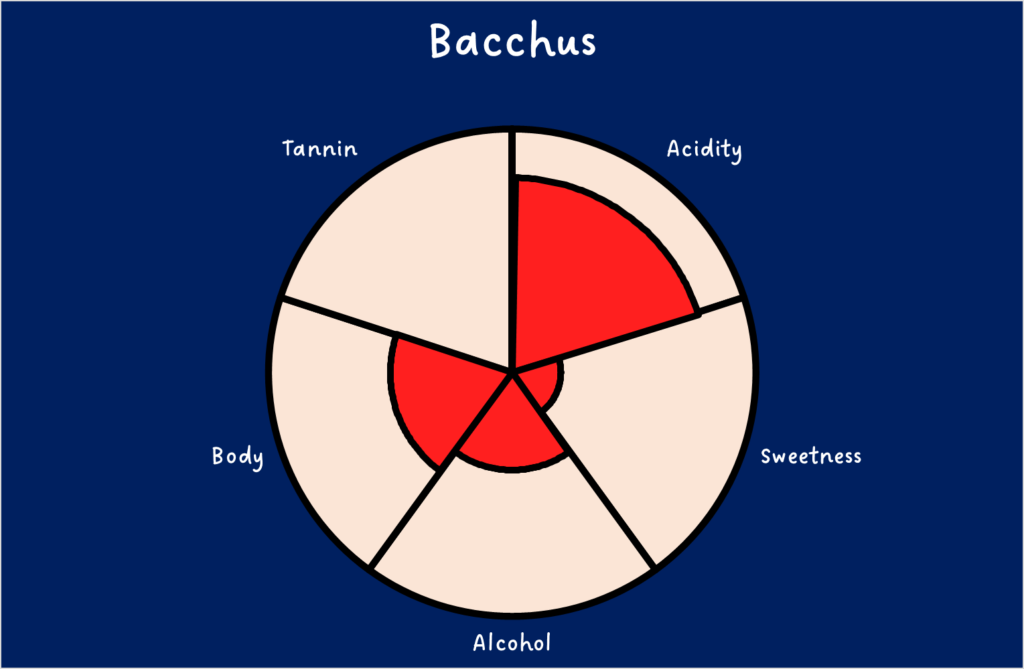
Nearly noble grape varieties: Bacchus
If you haven’t already heard it, English sparkling wines are beginning to compete with French Champagnes. But what about English still wines? Well, actually, my native country is not doing so bad there either these days. And many of the high quality still (and of course sparkling wines) are made from the Bacchus variety. In this post we explore the virtues of the wine named after the god of wine.
About the grape
This variety, which originated in Germany, is thin skinned and tends towards ripening early to mid-season. The vines tend to crop generously in tight clusters of grapes. It tends to thrive best in cooler climates. In these climates, this low acid yielding grape tends to not to ripen so much. This can preserve higher levels of acidity and mean less sugar develops in the grape.
Why it deserves its nearly noble status…
Its named after the god of wine – OK this one is a little tenuous, but come on, how could any serious wine lover not love a grape named after the god of wine?
England’s grape of choice – While the most planted grape variety in England is Chardonnay, most of which is used to produce sparkling wine, Bacchus is massively important for still wines. Its characteristics make it ideally suited to the English climate, and it tends not to ripen to the point it loses its acidity.
A unique flavour profile – While many like to compare Bacchus to Sauvignon Blanc, due to its, high acidity and aromatic flavour, it is quite different. In fact, in my opinion, English winemakers need to celebrate the very individual characteristics of this wine, rather than try to compete with the Marlborough favourite. Typically Bacchus tends to have a more floral note of elderflower and herbal note to it as well. While it is undoubtedly fresh, it tends to be a little rounder and less abrasive than Sauvignon Blanc. It can be so floral it can taste like a mouthful of soap suds! In a pleasant way!
A rising star – One of the great things about this nearly noble series is the ability to celebrate lesser known grape varieties which are on the rise. I think Bacchus is one to watch here.
Superb Orange wines – This grape particularly lends itself to natural wine making techniques and to producing orange wines. The wines can take on a much fuller flavour profile with marmalade, orange peel, somewhat spicier notes while floral notes slip more towards the background on the palette.
Profile
Depending on location and ripeness the degree of acidity can vary significantly, but in a typical English dry style this wine will have:
- Medium+ to High acidity
- Usually a dry style, although there are some off-dry wines
- Low to medium alcohol
- Medium body
- No tannin

The grape typically has flavours of green apple, citrus, with a floral hint of elderflower and honeysuckle. There can be mineral notes on the palette, as well as some background herbal notes. I have noticed a trend towards these wines being made in a style which retains subtle yeasty notes, and often a hint of oxidation or bruised apple.
Production
There are crops of this variety extensively across the United Kingdom. Other areas where this Bacchus is grown include: Germany, The United States and Canada. If you want a food pairing, obviously a British wine is going to go well with Fish and chips, but seafood generally is going to be a good match.
You’ll like Bacchus if you like:
Albariño, Sauvignon Blanc, Riesling, Furmint.
So has the grape named after the god of wine captured your imagination? Do those intense florals appeal to you, or are you lulled in by the crisp acidity? If you decide this grape is for you, I’d love to know what you think. Bacchus is very much a varietal grape from my country, so it would be great to hear what any international and natives make of it. As always, drop me a line and let me know! In the meantime, keep exploring this beautiful planet we live on, one glass at a time!